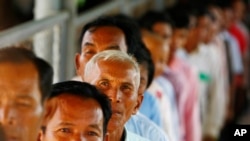On the one hand, the verdict and life sentences issued to Nuon Chea and Khieu Samphan Thursday mark a victory for the UN-backed tribunal. On the other, some observers say, they were a reminder of just how deeply affected Cambodia was by the brutality of the Khmer Rouge.
More than 1.7 million people died under the regime, from overwork, starvation or execution, in one of the worst atrocities of the 20th century. Thursday’s verdict brought some measure of resolution to victims, but the difficulty of dealing with such mass crimes was apparent to many observing the trials.
“We believe that the Trial Chamber decided fairly,” said Chea Leng, the Cambodian prosecutor for the court, representing a legal view held by many. Her international counterpart, Nicholass Koumjian, said the sentences were in proportion to the gravity of the crimes.
And in a statement, the US Embassy lauded the court’s judges and workers for their “commitment to justice.” “We hope that this verdict will offer a measure of peace and justice to the families of the victims of the Khmer Rouge,” it said.
But the verdict may also not be enough to heal the major psychic scars left by the Khmer Rouge, observers say.
“No matter how many people you punish, it’s not going to bring back the 2 million Cambodians that were killed,” said Peter Maguire, a legal scholar and author who has written about the regime.
Many Cambodians will not be happy with life sentences, he said, the maximum sentence allowable in Cambodia.
However, John Ciorciari, a professor of public policy at the University of Michigan who has written a book about the tribunal, said that despite the frustrations of some victims, the verdict represents a “very significant moment” for the court and for trials of Khmer Rouge leaders.
Kelly Askin, a senior legal officer with the Open Society Justice Initiative, which has monitored the tribunal’s work, said the court did more than deliver a verdict.
“It’s been nearly 40 years since the crimes have been committed, but justice delayed is better than no justice at all for the survivors,” she said. “The trials have opened dialogue in Cambodia about Khmer Rouge crimes, they’ve opened space to talk about justice and accountability, and hopefully at least a handful of perpetrators will die in prison with the taint of being labeled a criminal, instead of the comfort of their own beds.”







